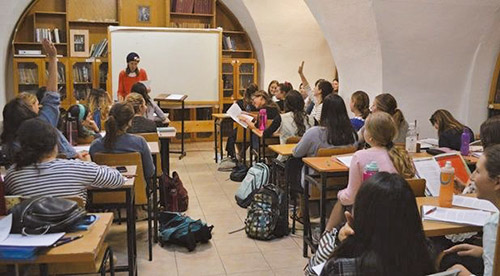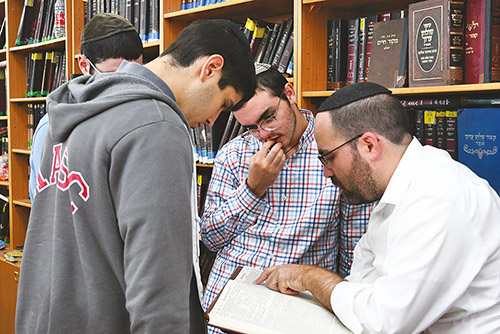
In 1962 I was awarded a scholarship to attend Yeshiva Kol Torah in Bayit Vegan in Jerusalem where there was a promising young rosh yeshiva named Rabbi Shlomo Zalman Auerbach. Unfortunately at that time it was not usual for high school graduates to go off to Israel for a year or two and my father, z”l did not allow me to go. Today it is an accepted rite de passage for almost every graduating high school senior, boy or girl, to spend a year or two learning in Israel prior to college. This development accelerated after 1967 which saw the creation of many new yeshivot and seminaries, especially yeshivot hesder where students combine their Torah studies with military service.
It has often been noted that there is more Torah study going on today, both qualitatively and quantitatively, than at any other time in our history. Lakewood, Baltimore, Cleveland, New York and elsewhere boast many yeshivot and kollelim. But there is something very special about Torah learning in Eretz Yisrael. Free from external pressures, far away from distractions, young men and women dedicate themselves full-time to the pursuit of Torah knowledge and a Torah way of life. The impact of this experience lasts a lifetime. My children had this experience and now my grandchildren are also learning in Israel.
During our stay in Israel, we were overwhelmed by the experience of sitting in shiurim with them. My grandson attends Yeshivat Sha’alvim, a high-level hesder yeshiva that is known for its dynamic learning program. Sha’alvim is nestled in the natural beauty of central Israel, along the fertile fields of the Ayalon Valley, halfway between Jerusalem and Tel Aviv. Surrounded by nature and removed from the distractions of a busy city, the Sha’alvim students blossom and grow to reach their fullest potential as a bnei Torah.

My grandson is in his second year at Sha’alvim and there are two shana bet shiurim of 40 boys each, aside from the other classes. These young men from the United States, Canada, Brazil, France, England, Belgium, Switzerland and Australia learn side-by-side with Israeli hesder students. Together, they develop study habits, learning skills and midot to shape their characters and guide them throughout their lives. Aside from the Israeli ramim, rabbis, there are many American rebbeim, mostly from the YU orbit. They are dynamic, inspirational, modern, approachable and deliver first rate shiurim. In the morning they hand out sources for the boys to review and then the shiur covers rishonim and acharonim on the sugya, in this case, Pesachim. Coincidentally, during our visit my grandson made a siyum in memory of his great uncle who died during Covid. There are several sedarim day and night.
One of my granddaughters attends Sh’alvim for Women in Malcha. There too the teachers are mostly passionate and talented American olim. It is quite inspirational to enter the beis medrash of both of these schools to observe the depth, breadth and excitement of kol Torah. While there my granddaughter celebrated a siyum on hamisha humshei Torah, all fuve books of the Torah, which we had been studying since before her bat mitzvah. Since it was the beginning of the new semester, girls can audit classes to see which ones they want to take. We sat in on a wonderful Jewish history class, which it turns out was taught by the daughter of a classmate who is a retired Jewish history professor. The learning here is accompanied by a great enthusiasm for Torah as modeled by the teachers. It is quite inspirational.
Our other granddaughter is studying at Midreshet HaRova located in the Old City. There too the classes are riveting and the girls are quite serious about their learning. We attended a Chumash class that was dynamic, challenging and engaging. Rav Bailey’s teaching style focuses on challenging his students to think and self-discover. His primary method of study is close textual analysis, encouraging his students to consider each word of a pasuk so as to discover and understand its deepest meaning. His peripatetic style left us breathless.
I am gushing over this experience because it is so powerful and formative. It is unfortunate that it takes a year or two in Israel to accomplish what 12 years of a day school cannot do. On the other hand if all that these 12 years does is get them to Israel for this experience, dayenu.
Rabbi Dr. Wallace Greene has had a distinguished career as a Jewish educator, administrator and consultant.











